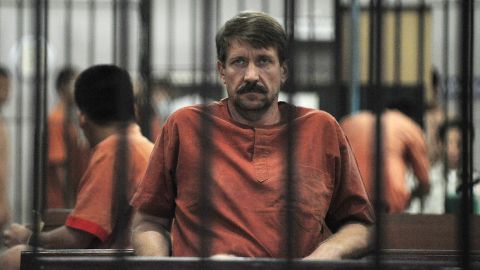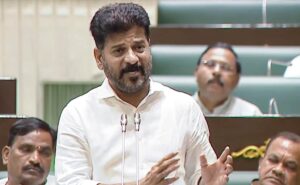Viktor Bout: Russian arms dealer known as the ‘Merchant of Death’ swapped for Brittney Griner | CNN

CNN
—
Brittney Griner’s freedom ultimately hinged on the release of a convicted Russian arms dealer whose life story inspired a Hollywood film.
The US basketball star was released on Thursday from Russian detention in a prisoner swap for Viktor Bout, nicknamed the “Merchant of Death” by his accusers.
Viktor Bout, a former Soviet military officer, is currently serving a 25-year prison sentence in the United States on charges of conspiring to kill Americans, acquire and export anti-aircraft missiles, and provide material support to a terrorist organization. Bout has maintained he is innocent.
The Kremlin has repeatedly called for Bout’s release, slamming his sentencing in 2012 as “baseless and biased.”
Russia’s foreign ministry said Thursday that Bout was returned to Russia after the exchange at Abu Dhabi Airport. Footage shared by Russian state television later showed Bout walking on a tarmac in Abu Dhabi, then boarding and sitting down inside a plane, which later landed in Moscow.
“For a long time, the Russian Federation has been negotiating with the United States on the release of V. A. Bout,” the ministry said in a statement. “Washington categorically refused dialogue on the inclusion of the Russian [citizen] in the exchange scheme. Nevertheless, the Russian Federation continued to actively work to rescue our compatriot.”
It added that as a result of Russia’s negotiations with the US, Bout had been “returned to his homeland.”
Bout’s US lawyer, Steve Zissou, said that Bout was with his wife and daughter. “We are grateful that after 15 long years, Viktor has finally been reunited with his family,” he added.
Griner – who had for years played in the off-season for a Russian women’s basketball team – was arrested on drug smuggling charges at an airport in the Moscow region in February. Despite her testimony that she had inadvertently packed the cannabis oil found in her luggage, she was sentenced to nine years in prison in early August and was moved to a penal colony in Mordovia in mid-November after losing her appeal.
The swap, which US President Joe Biden confirmed on Thursday, did not include another American that the State Department has declared wrongfully detained, Paul Whelan. Whelan was arrested on alleged espionage charges in 2018 and sentenced to 16-years in prison in a trial that US officials have called unfair.
Griner and Whelan’s families had urged the White House to secure their release, including via prisoner exchange if necessary.
At the center of their bid was Bout, a man who eluded international arrest warrants and asset freezes for years.
On the same day, Griner testified in Russian court as part of her ongoing trial on drug charges following her February arrest at a Moscow airport. Whelan was arrested on alleged espionage charges in 2018 and sentenced to 16-years in prison in a trial that US officials have called unfair.
The Russian businessman, who speaks six languages, was arrested in a sting operation in 2008 led by US drug enforcement agents in Thailand posing as the Revolutionary Armed Forces of Colombia, known by the acronym FARC. He was eventually extradited to the US in 2010 after a protracted court proceeding.
“Viktor Bout has been international arms trafficking enemy number one for many years, arming some of the most violent conflicts around the globe,” said Preet Bharara, the US attorney in Manhattan when Bout was sentenced in New York in 2012.
“He was finally brought to justice in an American court for agreeing to provide a staggering number of military-grade weapons to an avowed terrorist organization committed to killing Americans.”
The trial honed in on Bout’s role in supplying weapons to FARC, a guerrilla group that waged an insurgency in Colombia until 2016. The US said the weapons were intended to kill US citizens.
But Bout’s history in the arms trade extended much further afield. He has been accused of assembling a fleet of cargo planes to traffic military-grade weapons to conflict zones around the world since the 1990s, fueling bloody conflicts from Liberia to Sierra Leone and Afghanistan. Allegations of trafficking activities in Liberia prompted US authorities to freeze his American assets in 2004 and blocked any US transactions.
Bout has repeatedly maintained that he operated legitimate businesses and acted as a mere logistics provider. He is believed to be in his 50s, with his age in dispute because of different passports and documents.

“His early days are a mystery,” Douglas Farah, a senior fellow at the International Assessment and Strategy Center who co-authored a book on Bout, told CNN in 2010.
Farah told Mother Jones magazine in 2007 that according to his multiple passports, Bout was born in 1967 in Dushanbe, Tajikistan, the son of a bookkeeper and an auto mechanic. He said that Bout graduated from the Military Institute on Foreign Languages, a well-known feeder school for Russian military intelligence.
“He was a Soviet officer, most likely a lieutenant, who simply saw the opportunities presented by three factors that came with the collapse of the USSR and the state sponsorship that entailed: abandoned aircraft on the runways from Moscow to Kiev, no longer able to fly because of the lack of money for fuel or maintenance; huge stores of surplus weapons that were guarded by guards suddenly receiving little or no salary; and the booming demand for those weapons from traditional Soviet clients and newly emerging armed groups from Africa to the Philippines,” Farah told the magazine.
Bout has said that he worked as a military officer in Mozambique. Others have said it was actually Angola, where Russia had a large military presence at the time, Farah told CNN. He first became known when the United Nations began investigating him in the early-to-mid 1990s and the United States began to get involved.
Bout – who reportedly has used names including “Victor Anatoliyevich Bout,” “Victor But,” “Viktor Butt,” “Viktor Bulakin” and “Vadim Markovich Aminov” – is thought to have been the inspiration for the arms-dealer character played by Nicolas Cage in the 2005 movie “Lord of War.”
In 2002, CNN’s Jill Dougherty met with Bout in Moscow. She asked him about allegations against him – did he sell arms to the Taliban? To al Qaeda? Did he supply rebels in Africa and get paid in blood diamonds? – and he denied each claim.
“It’s a false allegation and it’s a lie,” he said. “I’ve never touched diamonds in my life and I’m not a diamond guy and I don’t want that business.”
“I’m not afraid,” he told Dougherty. “I didn’t do anything in my life I should be afraid of.”






